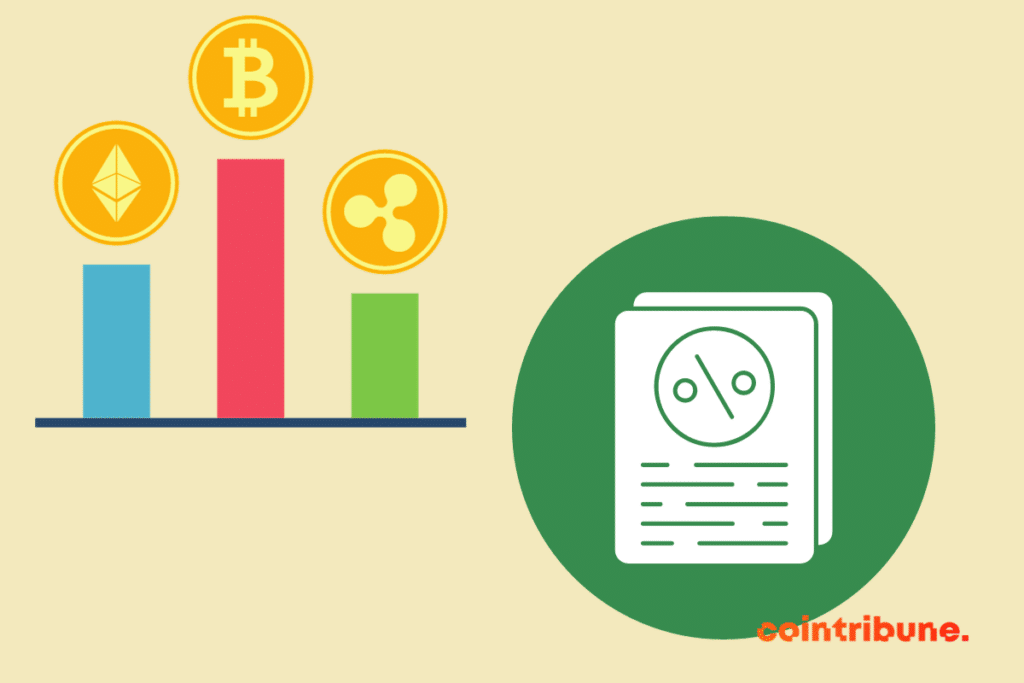Taxation in Trading: Rules for Traders
Trading, a complex and constantly evolving activity, requires a deep understanding of taxation, particularly in France where tax rules are diverse. For traders, whether they operate in stocks, cryptocurrencies, or other digital assets, mastering the tax aspects is crucial to maximizing returns and minimizing risks. This article sheds light on the current tax rules for traders, from amateurs to professionals, and offers strategic advice for optimized tax management.

The Basics of Taxation in Trading
In France, trading taxation is governed by specific rules that vary depending on the type of asset and the trader’s status. It is important for any trader to understand these rules to comply with tax obligations and optimize their tax returns.
Tax Rules for Amateur Traders
Amateur trading in France, particularly in the realm of cryptocurrencies and other digital assets, is subject to a specific set of tax rules. Here are all the specifics of taxation for amateur traders.
Declaration of Gains
The first step for an amateur trader is to correctly declare their gains. In France, gains from trading assets, including cryptocurrencies like Bitcoin, must be declared to the tax authorities. This declaration is made via the form dedicated to capital gains on digital goods. It is important to accurately document each transaction carried out during the fiscal year. This includes the purchase date, purchase price, sale date, and sale price. This detailed documentation is necessary to correctly calculate the realized capital gain, which is the basis for taxation.
Taxation of Capital Gains
Once the gains are correctly declared, they must be taxed. In France, capital gains realized by amateur traders are subject to a specific tax rate. This rate is determined based on the total value of the gains realized. It is important to note that losses can potentially be deducted from gains, which can reduce the taxable base. However, this deduction requires a deep understanding of the current tax rules. Therefore, traders must be vigilant and precise in calculating their capital gains to ensure they pay the correct and exact tax amount.
Specific Tax Rules for Cryptocurrencies
Cryptocurrencies, such as Bitcoin, have unique tax specifics. In France, gains from the sale of cryptocurrencies are considered capital gains on digital goods and must be declared as such. This means traders must be particularly careful when dealing with cryptos. They must track the fluctuations in the value of these digital currencies and document each transaction for accurate tax declaration. Additionally, with the constantly evolving legislation on cryptocurrencies, traders must stay informed of the latest tax updates to avoid any non-compliance.
Specific Tax Rules for Professional Traders
The taxation of professional traders in France presents notable differences compared to amateur traders. This distinction is crucial as it involves more complex and rigorous tax obligations.
Determination of Professional Trader Status
The first step for a trader in France is to determine if they are considered a professional. This status is generally attributed to individuals whose primary activity is trading and who carry out transactions frequently and substantially. Criteria include the volume of transactions, the frequency of operations, and the use of sophisticated techniques and strategies. Once this status is established, the trader is subject to a distinct tax regime, with rules and tax rates different from those of amateur traders.
Tax Regime for Professional Traders
Professional traders in France are subject to a specific tax regime. Unlike amateur traders, their gains are not simply taxed as capital gains on digital goods. Instead, their income is considered industrial and commercial profits (BIC) or non-commercial profits (BNC), depending on the structure of their activity. This regime often involves a higher tax rate and may include the general social contribution (CSG) and the contribution to the repayment of the social debt (CRDS). Understanding this regime is essential for a correct and optimized tax declaration.
Specific Reporting Obligations
In addition to a different tax regime, professional traders must also comply with stricter reporting obligations. This includes keeping detailed accounting records, regularly declaring their income, and submitting various tax forms. These obligations ensure complete transparency and tax compliance. It is therefore imperative for professional traders to maintain accurate records of all their transactions, including purchases, sales, gains, and losses, to facilitate the declaration process.
Different Types of Trading Products and Their Taxation
In France, taxation varies considerably depending on the type of product traded. This section focuses on three main categories: traditional stocks, cryptocurrencies, and derivatives.
Taxation of Traditional Stocks
Traditional stocks are a cornerstone of trading, and their taxation in France is relatively straightforward. When a trader makes a gain by selling stocks at a higher price than the purchase price, this gain is considered a capital gain. These capital gains are subject to income tax and social contributions. The tax rate depends on the holding period of the stocks, with deductions for holding periods reducing the taxable base. It is important for traders to record the purchase and sale date of each stock, as well as the purchase and sale price, to accurately calculate the capital gain and correctly declare their gains.
Taxation of Cryptocurrencies
Gains from cryptocurrency transactions are treated differently from traditional stocks. They are considered capital gains on digital goods and are subject to a specific tax regime. Traders must declare these gains via a separate form, and the tax rate is generally fixed, regardless of the holding period. However, the volatility of cryptocurrency values and frequent legislative changes require traders to be extra vigilant to remain compliant with tax requirements.
Taxation of Derivatives
Derivatives, such as options and futures contracts, also have their own tax framework. In France, gains from these instruments are generally treated as profits or losses within the scope of trading activities. Taxation depends on the nature of the derivative product and how it is used in the trading strategy. For example, gains from options can be taxed differently depending on whether they are used for hedging or speculation purposes. Traders must therefore understand the specific rules applicable to each type of derivative product to ensure their tax declarations are correct and complete.

Recent Developments and Prospects in Trading Taxation
The tax landscape of trading has undergone significant changes in recent years, particularly in France. These changes are mainly due to the emergence of new assets like cryptocurrencies and the need to adapt tax legislation to the realities of the modern market. Examining these changes and anticipating future trends is essential for any trader wishing to remain compliant and optimize their tax strategy.
Reform of Cryptocurrency Taxation
One of the most notable changes concerns the taxation of cryptocurrencies. In France, the tax legislation regarding cryptos has been updated to reflect the growing popularity and volatility of these digital assets. Gains from the sale of cryptocurrencies are now considered capital gains on digital goods and are subject to a fixed tax rate. This reform aims to simplify the declaration and taxation of cryptocurrency gains, but it also requires traders to be extra vigilant in tracking fluctuating values and accurately declaring their transactions.
Adaptation to New Forms of Trading
With the evolution of financial markets, new forms of trading, such as algorithmic trading and high-frequency trading, have gained popularity. French taxation is gradually adapting to these new methods. Traders using these techniques must be aware of the potential tax implications, such as the classification of their activities as professional and the resulting tax obligations. This legislative adaptation aims to ensure fair taxation while recognizing the particularities of these modern approaches.
Future Prospects and Trends
Looking ahead, it is likely that taxation will continue to evolve to align with global trends and technological innovations. Therefore, traders must stay informed about legislative developments, especially regarding digital assets.
Practical Tips for Effective Tax Management in Trading
The complexity of trading taxation requires a strategic and well-informed approach. Here are some tips to help traders succeed in this area.
Maintaining Accurate Records
Keeping accurate records is the foundation of effective tax management. This involves meticulously documenting each transaction, including the purchase and sale dates and prices, transaction fees, and any relevant adjustments. For cryptocurrency traders, it is important to closely monitor the fluctuating values of cryptos like Bitcoin, as these variations directly influence the calculation of capital gains or losses. Detailed records are indispensable not only for tax declaration but also as proof in case of an audit by tax authorities.
Using investment tracking software or platforms with integrated reporting features can simplify record-keeping. These tools allow for automatic transaction tracking and detailed report generation, reducing the risk of human error. It is also wise to keep all statements and transaction confirmations issued by brokers or exchange platforms, as they provide official documentation if needed.
Understanding Tax Obligations
Each product has its own tax specifics. For example, traditional stocks are subject to capital gains tax, with rates varying depending on the holding period. Cryptocurrencies are treated differently, taxed at a fixed rate on realized gains. Traders must also understand the distinction between tax regimes for amateur and professional traders, as this influences how income is declared and taxed.
As tax legislation is constantly evolving, traders must keep abreast of the latest changes. This can involve following financial news, regularly consulting official tax authority websites, or participating in training and seminars on trading taxation. For more complex situations, such as high-frequency trading or investments in derivative products, consulting a tax expert may be advisable. These professionals can provide personalized advice and help navigate the more technical aspects of taxation.
Using Available Resources
Traders should not hesitate to consult tax experts, especially for complex questions or unique situations. These experts can offer tailored advice and help understand the nuances of applicable taxation. Additionally, French tax authorities and various platforms provide guides and tools to help traders understand their tax obligations. These resources are often updated to reflect the latest legislative developments and can be extremely useful.
Online forums, trader groups, and professional social networks can be excellent sources of information and advice. Interacting with other traders allows for the sharing of experiences, strategies, and tips for effective tax management. Additionally, regular information monitoring on legislative changes and market trends is necessary to stay up-to-date. Traders can subscribe to specialized newsletters, follow recognized blogs, or participate in webinars and online conferences.
Conclusion
Navigating the complex world of cryptocurrency trading taxation in France requires a methodical and informed approach. Whether managing stocks, cryptocurrencies, or other digital assets, a clear understanding of tax obligations and rigorous record-keeping are necessary. By leveraging available resources, consulting experts, and staying updated on legislative developments, traders can optimize their tax strategy. This ensures compliance with regulations while maximizing profitability potential.
Maximize your Cointribune experience with our "Read to Earn" program! For every article you read, earn points and access exclusive rewards. Sign up now and start earning benefits.
Diplômé de Sciences Po Toulouse et titulaire d'une certification consultant blockchain délivrée par Alyra, j'ai rejoint l'aventure Cointribune en 2019. Convaincu du potentiel de la blockchain pour transformer de nombreux secteurs de l'économie, j'ai pris l'engagement de sensibiliser et d'informer le grand public sur cet écosystème en constante évolution. Mon objectif est de permettre à chacun de mieux comprendre la blockchain et de saisir les opportunités qu'elle offre. Je m'efforce chaque jour de fournir une analyse objective de l'actualité, de décrypter les tendances du marché, de relayer les dernières innovations technologiques et de mettre en perspective les enjeux économiques et sociétaux de cette révolution en marche.
The views, thoughts, and opinions expressed in this article belong solely to the author, and should not be taken as investment advice. Do your own research before taking any investment decisions.